As we enter the second month of stay-at-home orders around the U.S., the strain on the home kitchen is already clear; stores and vendors are adjusting to changing food demands and the supply chain has been impacted.
Certain ingredient shortages we encounter while managing with limited grocery shopping runs make cooking dinner — and breakfast, and lunch, and snacktime, and dessert, and midnight snack — all the more difficult.
For those battling food insecurity, school meal services and food banks are working overtime to help provide necessary meals and supplies. But for those looking at empty pantry shelves while delaying a grocery trip to stock up further on in-demand items like beans and oat milk, a few innovative swaps can mean that a missing ingredient here or there won’t throw off your meal planning. For advice, TIME turned to Alissa Wagner, chef and co-founder of the popular downtown New York City restaurant Dimes and co-author of the recently published cookbook Emotional Eating, as well as baker and Great American Baking Show winner Vallery Lomas, who’s popular on social media as the “Foodie in New York,” and pastry chef and Milk Bar founder Christina Tosi, who has been teaching fans with daily live Instagram tutorials.
Wagner called from her restaurant’s associated market, which is still serving prepared foods — and remains busy and well-stocked. “Start simply and play around with things,” Wagner says. “You really can look at cookbooks and recipes and try not to be intimidated and enjoy it.” Lomas, meanwhile, has been testing out simplified recipes from her studio apartment in Harlem that are “fuss free” and work for smaller crowds — or even portioned just for one. “Don’t let fear of failure stop you,” she said. Tosi keeps things interesting by playing music themed to match her culinary pursuits (like a “queens of pop” playlist while making popovers) — and sharing what she makes, as much as she safely can. “Kitchen time never feels like a chore when you approach it with a generosity of spirit mentality,” she says. “Now is the time to spread the love more than ever.”
Here, Wagner, Lomas and Tosi share their suggestions for what to do when you run out of some of the basics. And while this guide doesn’t cover everything you might need to make your preferred dish of the evening to the recipe’s exact specifications, it might help you come up with some creative solutions. “I like to look at my pantry with a sense of imagination,” Tosi says. “Approach every ingredient with a ‘What does this typically bring to the dish or snack I use it in?’ Write it down and come back to it when you put your apron on.”
Egg Substitutes
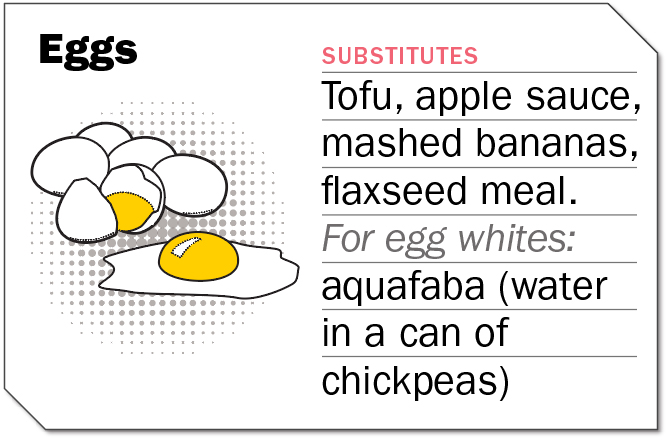
Eggs are a refrigerator staple, but once you’ve worked through your regular dozen, you may find yourself uncertain of what to use as a replacement. If it’s a breakfast protein you’re in the mood for, Wagner recommends turning to tofu, which can be prepared as a scramble and lasts a long time in the fridge.
Although eggs are hard to match in taste as a standalone food — and Tosi cautions against trying to replace them in a recipe if it calls for more than a few — there are a number of workable stand-ins. If you’re baking, do as the vegans do: consider swapping in apple sauce or another fruit you can cook or puree, which provides the same binding properties in baked goods as eggs. (Mashed bananas are a common option, too, and very cost-effective if you buy bunches in bulk. They can also be frozen for later use.) Tosi says a neutral-flavored oil could also help provide structure and moisture.
Lomas and Tosi also recommend the “flax egg” — letting a tablespoon of flaxseed meal soak in a few tablespoons of water for a few minutes. The resulting jelly-like concoction will work in lieu of real eggs, and is “every vegan’s favorite trick,” Tosi says.
If you’re looking for egg whites, the water in a can of chickpeas, called aquafaba, will suffice. Meringues, mayonnaise and cocktails like a pisco sour can use aquafaba instead of real egg whites. Vegans have been using the replacement source for years.
Milk Substitutes
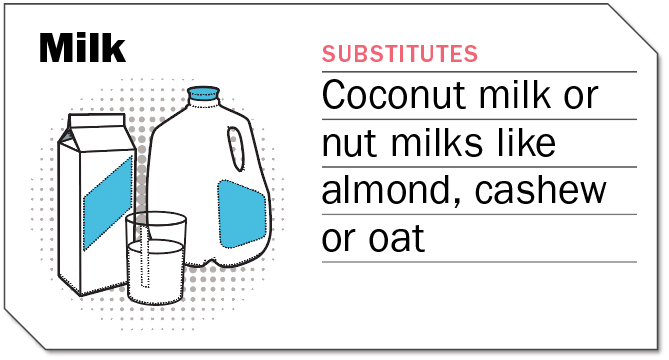
When dairy supplies run low, fortunately there are plenty of milk substitutes that are more shelf-stable than perishable dairy. Wagner particularly likes coconut milk, which you can keep in your pantry and will work as a replacement for regular milk when thinned with some water. (“It’s a lot fattier than regular milk,” Wagner explained.)
“Match your milk sub with the flavor profile of what you are baking,” Tosi says. So for bundt and loaf cakes, for instance, she sometimes turns to sour cream and Greek yogurt.
If you have nuts lying around, making your own nut milk is also a possibility: Wagner recommends a three-part water to one-part nut ratio, soaked overnight and blended. A clean t-shirt will do as a strainer, she says. Wagner likes cashew milk, which has a “really nice sweetness — and it’s a little cheaper than almonds,” making it a more cost-effective option. Almonds and oats also work, and Tosi says nut milks are a good option for pancakes, crepes and bar cookies. “I’m not above melting down vanilla ice cream to sub in for milk, either,” she adds. “Embrace all the milky things,” she said. Yes, even whipped cream.
If you don’t have milk, Lomas suggests simply using water instead of milk for a substitute in baking. “And when all else fails,” Tosi notes, “don’t underestimate the power of milk powder,” which you can mix with water, too.
Cheese Substitutes
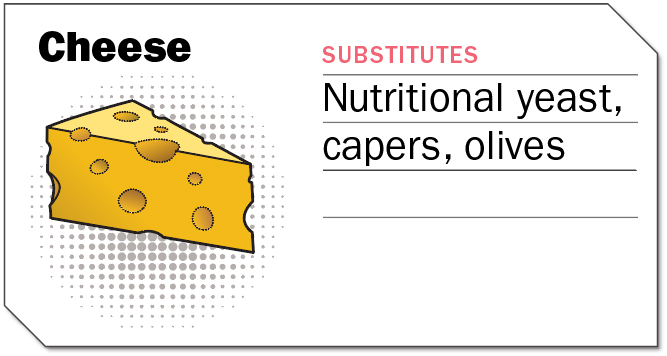
There is an almost infinite variety of cheeses on the market. But when it comes to the cheese that we use most often, it’s generally as an additive on other dishes for that umami kick. Nutritional yeast will work as a substitute in many pasta dishes, Wagner says. Or for saltiness, you can try out capers and olives, which last in the pantry and fridge and bring in the “salty brininess” you might be missing when you run out of parmesan, notes Wagner.
For Tosi, the pantry or snack cabinet could also hold answers. “I’ll take the flavor packet from my mac and cheese to make my own Cheez-Its, or use a box of cake mix and some cream cheese for a gooey butter cake,” she says.
Butter Substitutes
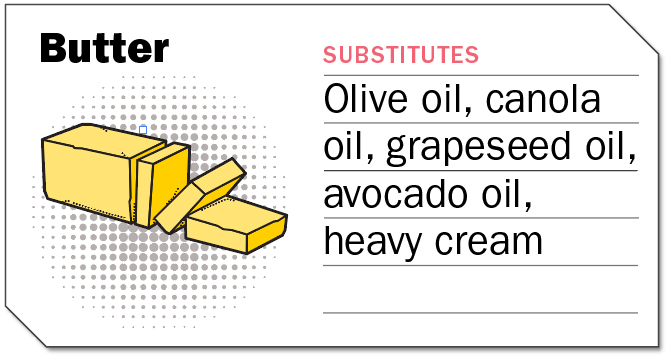
For cooking, oil — olive, canola or even grapeseed or avocado — can generally be used as a butter substitute, provided you select an oil with a flavor that complements the rest of your ingredients. “It depends on the recipe as to how well this swap will work,” Lomas says. Coconut oil, for instance, has a flavor all its own. Used in a cookie recipe, canola and vegetable oil will result in a “sandier textured cookie,” Tosi says. The conversion is also not a direct one-to-one swap between butter and oil, since butter also has milk fats that an oil may lack; you might need a few tablespoons fewer of oil than butter for a cake, for instance.
Then there’s old school shortening, which Tosi says is a “best bet” for matching butter’s flavor and structure; margarine is another option, although not as flavorful. If the butter is being used as an especially creamy component, like in a risotto, you could try a heavy cream.
Bread Substitutes
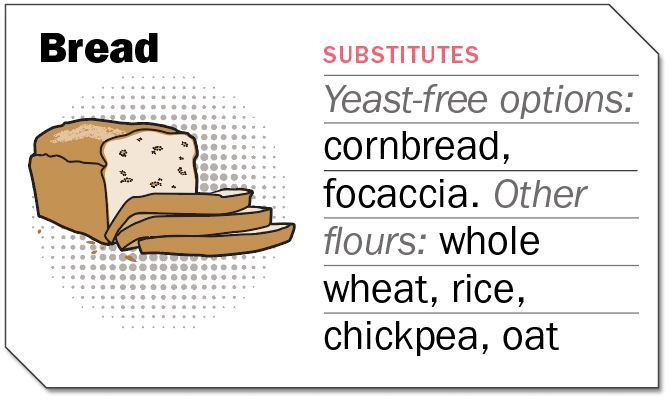
If you’re craving homemade carbs — perhaps inspired by the proliferation of amateur baking projects you’re seeing on social media — there’s plenty to choose from. Amid flour and yeast shortages, there are still breads you can make that don’t require yeast.
Cornbread, Wagner says, should fit the bill — provided you can find cornmeal. Simpler bread recipes like focaccia are another option, as it is made without yeast. Tosi turns to her “fool-proof beer bread,” since beer already has yeast in it. (Her recipe: 1 beer, 3 cups flour, 4 teaspoons baking powder, 1 teaspoon salt, ½ cup butter melted.) She also recommends adapting bread recipes by cutting “all but one tablespoon sugar out” and throwing spices and seed in, like za’atar or curry powder, for a more aromatic loaf.
Lomas has been baking basics like wheat bread from scratch using whole wheat flour. Other alternative flours, like rice or chickpea, are common in gluten-free recipes and can be used widely. Wagner likes chickpea flour which is less “gummy” than rice flour and makes “really good savory pancakes.” Tosi suggests cake flour, which has a lower protein content. Nut flours — nuts ground up in a food processor until they are “sandy,” with a few tablespoons of cornstarch to encourage the binding — are her recommendation for cookies. Oat flour (ground up oats) also can work: 1 ⅓ cups oat flour for 1 cup all purpose flour, says Tosi. Lomas is also a proponent of oat flour, which works well in her cookies and is a decently affordable option.
Even beyond the expected flour alternatives, Tosi suggests turning to other dry ingredients that can grind down into a flour-like consistency, like popcorn and pretzels. (“Popcorn flour is fire!” she says, but keep an eye on the overall salt content if you use pretzel flour.)
Sugar Substitutes
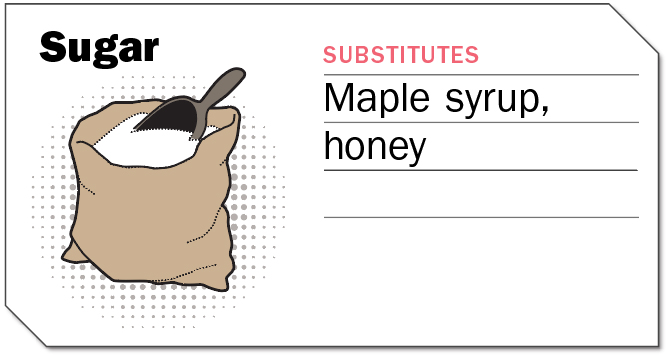
When running low on sugar, look to other sweeteners you have at hand: maple syrup and honey, both of which are actually lower on the glycemic index than regular processed sugar, Wagner says. Plus, both maple syrup and honey last a long time without going bad. Lomas even uses honey in her homemade whole wheat bread recipe. Agave is another natural sweetener option.
Tosi suggests thinking even further beyond the basics when it comes to bringing sweetness to a recipe. “Most things you crave late at night can work, too: marshmallows, chocolate, white chocolate chips, peanut butter, sorbet melted down, and candy.”
Brown sugars can also be whipped up at home if need be: light brown sugar can be concocted by adding a splash of maple syrup to granulated sugar, while to mix your own dark brown sugar you can add molasses. And powdered sugar, to top things off? Blend granulated sugar with a pinch of cornstarch. “In the baking world it’s called 10x, in reference to it being ground down 10 times,” Tosi says of powdered sugar’s origins.
You can also look beyond sugar for flavor in your baking. “If you like a salty-sweet combo, throw potato chips, pretzels, butterscotch chips — you name it — in your cookie dough or loaf or pancake batter,” Tosi says.
Keep up to date with our daily coronavirus newsletter by clicking here.
Meat Substitutes
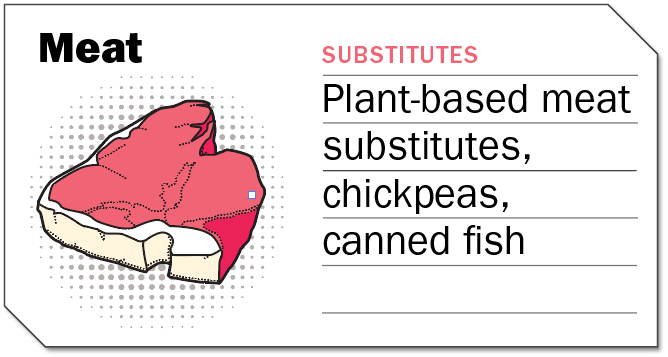
Alternatives to meat — like plant-based brands Beyond Meat or the Impossible Burger — are buzzy, but can get pricy. To fulfill the central protein portion of a meal, Wagner looks farther afield to vegetarian staples like tofu, which can be bought in bulk for a more cost-conscious solution, or chickpeas. “They’re very filling and versatile; they take to spice and herbs very well,” she says, suggesting a simple preparation with olive oil, fresh lemon juice, sea salt, chopped cilantro and red pepper flakes (or Aleppo pepper if you have it).
Or turn to canned goods. Canned fish — like sardines, anchovies and tuna — is shelf-stable and stores well, and works as a meal centerpiece. Wagner suggests a spin on the classic French Niçoise salad, featuring a canned fish and “any vegetable” you have on hand, or you can serve the fish on toast.
Greens and Vegetable Substitutes
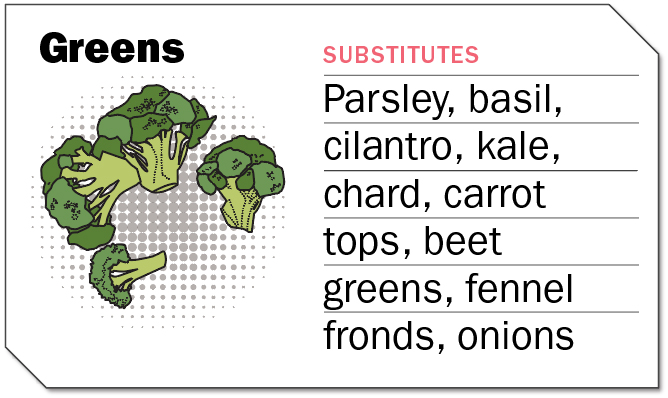
By the end of two weeks without restocking at a grocery, vegetables may have wilted. But Wagner reminds us that “any kind of soft herb” or the green part of a vegetable can be used as a base for a salad or a green addition to a meal, including parsley, basil, cilantro, kale or chard. “Carrot tops, beet greens, even fennel fronds — anything like that you can use, instead of throwing it out,” she says.
And don’t overlook your onions. “One thing people always have lying around that can upgrade anything are onions. You can pickle them easily and throw them into a salad; you can fry them and throw them in with beans, or sauté them into your eggs. It adds a ton of flavor in a really easy way,” she says.
Pickling is a helpful way of extending the lifespan of leftover vegetables, too. “All you really need is vinegar, salt and sugar. Everything else is a bonus,” Wagner says of the pickling process.
Please send any tips, leads, and stories to virus@time.com.
More Must-Reads from TIME
- Inside Elon Musk’s War on Washington
- Meet the 2025 Women of the Year
- The Harsh Truth About Disability Inclusion
- Why Do More Young Adults Have Cancer?
- Colman Domingo Leads With Radical Love
- How to Get Better at Doing Things Alone
- Cecily Strong on Goober the Clown
- Column: The Rise of America’s Broligarchy
Write to Raisa Bruner at raisa.bruner@time.com